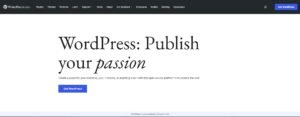When searching for web design agencies, you’re not simply looking for someone who can make your own website look great. You might one day want to log in to the website and make changes to text, images and even add a new page or blog.
A complete website comes with its own infrastructure, design, objectives, and appearance. However, this cannot stand on its own. To be successful, it must be built (developed) on a platform known as a content management system (CMS).
There are some CMS that are simple, complex, open-source, and restrictive. The best website builders are typically considered user friendly and flexible. Depending on your web design needs, it’s best to know which platforms are available, which helps you make the best choice.

1. WordPress
WordPress is perhaps the world’s most popular and best website builder platform for a business website, online store, user portals and more.
It’s simple, familiar layout (UI) is intuitive, and offers a vast array of customization choices, allowing non-designers to construct attractive websites that are adaptable to mobile devices.
WordPress also includes a number of additional features, such as:
- Free and paid alternatives
- A huge market for active plug-ins — like Google Analytics, social media tools, and search engine optimization (SEO) tools
- Easy content management system (CMS)
- Numerous customization options
- Ecommerce functionality
This is a free web builder specifically built to make your website look attractive, load quickly, and work exactly as you like. It can be mastered in a matter of days, and it’s frequently possible to do so within a few hours if you use one of the many drag and drop interfaces, such as Elementor.
Overall, WordPress is a free website builder, but you’ll have to pay for your own domain name and web hosting. There are also paid templates, plugins and other add-ons that might take your new site to the next level.
2. Squarespace
Squarespace has been in the business of web design platforms for almost 10 years, and it was created with user-friendliness in mind.
In general, it can be a little restricted when it comes to design, especially if you want to add distinctive bells and whistles to your web pages, but it functions effectively on its own. It’s an excellent product for the few common features that come with it.
Among Squarespace’s advanced features are:
- Free and paid alternatives
- Simple, straightforward UI
- Ecommerce capabilities
- Extensive modules
- Support forums
Squarespace comprises four tiers of paid plans, and all yearly plans provide users with unlimited storage and bandwidth, a free custom domain, and Secure Sockets Layer (SSL) protection.

3. Magento
Magento is a popular web design platform, particularly for eCommerce websites. It’s designed to help build a website that sells digital or physical goods as efficiently as possible over the Internet. Even if you’re using the basic free plan, there are several advantages to using Magento.
The most notable features of Magento include:
- Free and paid alternatives
- Open-source adaptation
- Ecommerce specialization
- Huge range of support network
- Lead customer support for users
Overall, it is a remarkably comprehensive, supported piece of software that may do wonders for your professional site.
4. Wix
Wix is considered an entry level CMS and one of the most straightforward drag-and-drop website builder platforms available.
It features a practical, what-you-see-is-what-you-get (WYSIWYG) layout and is almost unnecessarily simple. Individual pages can be modified mostly by clicking and dragging, with minimal coding required.
By subscribing to one of its premium plans, it is ideal for the hands-on project manager who wants to update their e-commerce website without constantly contacting the web design agency.
Some of Wix’s primary benefits include:
- Has an artificial design intelligence (ADI) system
- Free domain for a year and free SSL certificate
- Free and incredibly affordable paid options
- Insightful “Help” options
- Extensive selection of templates
The majority of Wix users don’t have coding skills; instead, they are visually-oriented individuals who value simplicity and speed.
Wix may lack the power of other platforms, but its drag-and-drop editor is so simple to use that even a beginner web designer can personalize their website in minutes. Overall, Wix is a terrific option for businesses who want a simple-to-edit, professional website-building platform with a free trial.

Choosing The Best One For You
There are a number of factors to consider, including whether you need e-commerce features, photo galleries, free business email, or simple web hosting services before selecting the best web design platform for you. Ultimately, understanding what your site requires to be successful is a process of learning.
Due to its scalability and many more capabilities, WordPress is an excellent option if you’re still determining your website’s needs. Many web design agencies and professionals prefer WP and use it exclusively. WooCommerce is a native plugin for WordPress and works great for those who need an e-commerce option with an integrated payment solution.
If you’re not sure precisely what characteristics your small business website should have, you can contact us here at Direct Allied Agency for free advice.








